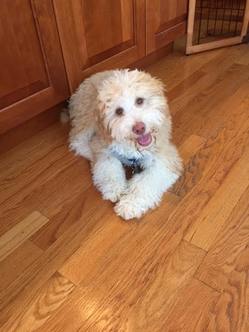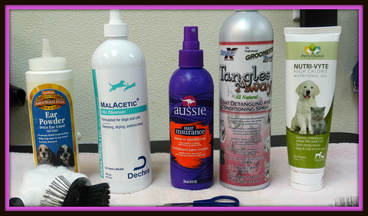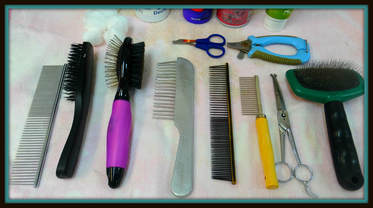Bringing Home Puppy ~ ~ ~

A New Puppy Means A Big Change In Your Life, And It Helps To Be Prepared. Taking time to plan ahead and get things in order, will make a big difference in the long run. Start out with the right atitude. The first weeks of your new puppy's life with you, will be busy and demanding. There may be times when you wonder if getting a puppy was such a good idea. Things will go better if you have patience and keep your sense of humor. Remember that puppyhood only happens once. The extra effort you put into it now will pay off in the future.
What you'll need: Get the supplies and equipment you'll need. These are just suggestions for you to think about.
> Wire or plastic dog crate
To a puppy, the world is brand new and fascinating! He's seeing it all for the very first time and absolutely everything must be thoroughly investigated. Puppies do most of their investigating with their mouths -- "Look at this! What is it? Something to eat? Something to play with?" Murphy's Law says that a puppy will be most attracted to the things he should least have -- electrical cords, the fringe on your expensive oriental rug, your brand new running shoes, etc.
Preventing destructive and dangerous chewing is easier than trying to correct the puppy every second. Look around your home. What objects could be put up out of the way of a curious puppy? Bitter Apple spray can be applied to furniture legs, woodwork and other immovable items. Are there rooms your puppy should be restricted from entering until he's better trained and more reliable? Install a baby gate or keep the doors to those rooms closed.
Take a walk around your yard looking for potential hazards. If your yard is fenced, check the boundaries and gates for openings that could be potential escape routes. Puppies can get through smaller places than an adult dog. If your yard's not fenced, make a resolution right now that your puppy will never be allowed to run off lead without close supervision. He won't ever know enough to look both ways before crossing the street to chase a squirrel. Keep him safe by keeping him on leash!
Use a schedule Work out a schedule for you and the puppy. Housetraining is much easier when the puppy's meals, exercise and playtimes are on a regular schedule throughout the day. Housebreaking is a whole subject in itself, one there isn't time for in today's short column. Your book on puppy care and training should have a section on housebreaking with suggestions and a recommended schedule. Read through it and create a game plan before the puppy arrives. Many people like to bring their puppies home on a weekend in order to devote extra time to settling in and housebreaking those first few days.
Everybody needs their own place. Decide where to put the dog crate, and have it set up and ready for his arrival. Where to keep the crate will depend on what's most convenient for you as well as the puppy's response. Many puppies don't like to be isolated in one part of the house while their family is in another but some puppies won't settle down in their crates if there's too much activity going on around them. You might have to experiment with different locations until you learn what works best for both you and the puppy.
Visit your vet. Make an appointment with your veterinarian to give the puppy a complete checkup within 72 hours of your purchase. If you don't have a vet yet, ask friends or family or local kennel club for a recommendation. Although the puppy has been health-checked by us, an exam is your insurance that puppy is just as healthy as we say he is. Show the health records that come with your puppy to your vet, so they know what has already been given.
Ask questions! Don't be afraid to ask me questions. We want your relationship with your puppy to be successful and can offer many tips based on years of experience.
What you'll need: Get the supplies and equipment you'll need. These are just suggestions for you to think about.
> Wire or plastic dog crate
- Easily washable, hard-to-destroy bedding material, imitation sheepskin works well, tip-proof, stainless steel or hard plastic food & water dishes.
- Puppy collar & lead, or a soft harness.
- ID Tag with your phone number to wear on the collar.
- a collection of high quality, safe chew toys, made for the size of puppy you are getting.
- grooming supplies: ask me for recommendations
- a quality brand of dry puppy food / we feed Hill's Science Diet to our puppies and adult dogs. You will get some with your puppy. Use this to make a gradual change, if you do change. When we send food out with your new baby - we put some Pro Bios on it - this is a white powder - you can get it in various places. It is a probiotic - and we feel it is good for the puppies to have that - when making this transition from our home to yours. We feed the tiny puppies the Extra Small / Petit Puppy from Royal Canin, it goes up to 9 pounds, mature weight. The Small Puppy formula is for 9-22 adult weight puppies.
- "Bitter Apple", a safe spray-on product to discourage chewing on inappropriate objects.
- a wire, wooden or plastic “baby gate” for blocking doorways.
- a good book on puppy care & training . Read through them before bringing your puppy home. When we register your puppy's microchip - it will also give you access to some online training videos. These are helpful in covering the basics.
To a puppy, the world is brand new and fascinating! He's seeing it all for the very first time and absolutely everything must be thoroughly investigated. Puppies do most of their investigating with their mouths -- "Look at this! What is it? Something to eat? Something to play with?" Murphy's Law says that a puppy will be most attracted to the things he should least have -- electrical cords, the fringe on your expensive oriental rug, your brand new running shoes, etc.
Preventing destructive and dangerous chewing is easier than trying to correct the puppy every second. Look around your home. What objects could be put up out of the way of a curious puppy? Bitter Apple spray can be applied to furniture legs, woodwork and other immovable items. Are there rooms your puppy should be restricted from entering until he's better trained and more reliable? Install a baby gate or keep the doors to those rooms closed.
Take a walk around your yard looking for potential hazards. If your yard is fenced, check the boundaries and gates for openings that could be potential escape routes. Puppies can get through smaller places than an adult dog. If your yard's not fenced, make a resolution right now that your puppy will never be allowed to run off lead without close supervision. He won't ever know enough to look both ways before crossing the street to chase a squirrel. Keep him safe by keeping him on leash!
Use a schedule Work out a schedule for you and the puppy. Housetraining is much easier when the puppy's meals, exercise and playtimes are on a regular schedule throughout the day. Housebreaking is a whole subject in itself, one there isn't time for in today's short column. Your book on puppy care and training should have a section on housebreaking with suggestions and a recommended schedule. Read through it and create a game plan before the puppy arrives. Many people like to bring their puppies home on a weekend in order to devote extra time to settling in and housebreaking those first few days.
Everybody needs their own place. Decide where to put the dog crate, and have it set up and ready for his arrival. Where to keep the crate will depend on what's most convenient for you as well as the puppy's response. Many puppies don't like to be isolated in one part of the house while their family is in another but some puppies won't settle down in their crates if there's too much activity going on around them. You might have to experiment with different locations until you learn what works best for both you and the puppy.
Visit your vet. Make an appointment with your veterinarian to give the puppy a complete checkup within 72 hours of your purchase. If you don't have a vet yet, ask friends or family or local kennel club for a recommendation. Although the puppy has been health-checked by us, an exam is your insurance that puppy is just as healthy as we say he is. Show the health records that come with your puppy to your vet, so they know what has already been given.
Ask questions! Don't be afraid to ask me questions. We want your relationship with your puppy to be successful and can offer many tips based on years of experience.

